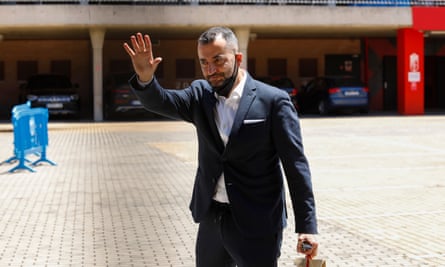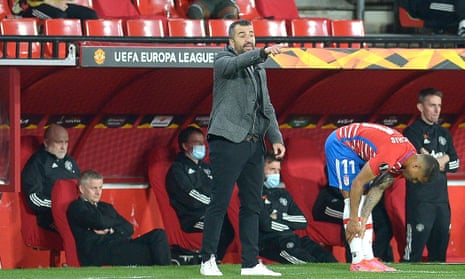“There were almost tears in my eyes, bloody hell,” Diego Martínez says. “Friday night, the first game I’d been at with fans for 18 months. Brentford-Arsenal, back in the top division after 70-something years. Everyone singing Hey Jude, a cappella. Just the walk to the ground, the tube. The people. That’s where it started. Tottenham – Totnúm, no? – Chelsea, West Ham, Watford. Fulham, taking photos of it all. Those wooden seats, by the river. Wonderful. Everton, Liverpool, Man City, United …”
Four months earlier, Martínez had taken Granada to Old Trafford to face Manchester United, leading them from the second division to a first appearance in Europe and reaching the quarter-finals of the Europa League. But this time was different: this time the stadium was full and, having decided to take a step back in the summer, now he sat in the stands not on the bench. What does a manager actually do when he’s not working? A question starts a conversation but doesn’t necessarily end it, and if there’s something that emerges it is not just him, it is us. And, the Spaniard insists, there is still something about English football.
So, to the question that starts it all. It’s not wait by the phone and if there is no money there are more matches to watch than ever. The coaching staff are a team, drawn together and dependent upon him. Between them they distribute games to analyse and report on. There are players to watch, teams too, partly focused on a potential next phase, but Martínez says it’s more about “research, study: the chance to see the direction the game is going, to learn.”
For Martínez, whose coaching career came via university and began at 25, that meant England. Not because he will work in the country necessarily, but because that is where trends emerge, somewhere to seek an education, to develop. “A level above the rest,” he says. Somewhere with a pull, too. “When I was a kid, I would go to my cousin’s to watch the Premier League because he had Canal Plus. I saw [David] Beckham from the halfway line at Wimbledon there. You think: ‘This is different, I have to experience it’.”
So he did, travelling with his wife and five-year-old daughter, heading to England for “three months that were like a five-year Master’s degree”, first near London and then in Manchester to see how clubs and coaches work, how the game is played and lived. How it is expressed too, jotted down in a little notebook he carried everywhere. The choice of words says something about how a coach conceptualises the game and is a cultural manifestation too.
“They cheer ‘yes’, not ‘goal’,” – “tackle” is an English word, and among the phrases that stick in his mind is: “Don’t over-play!” There is a reason some vocabulary doesn’t translate and it’s not purely linguistic. A discussion revolves around a question: when is attraction commitment? Most coaches attract opponents, drawing them in; at Manchester City, they commit, he notes. “Little details.”
The generosity he outlines from others is striking, unexpectedly open: a willingness to share knowledge, something almost collegiate in it. The first lessons in language and culture came at Biggleswade at the ninth level of the pyramid, football in a pure form. Others came across the country, including at Watford – “they were very good with me and, madre mía, they have incredible resources; not just financial but the people, the ideas, the structure” – at Everton with Rafael Benítez, at City with Pep Guardiola and assistant coach Juanma Lillo.

“Juanma is a phenomenon,” Martínez says. “He sees things differently, and can communicate it. Pep said of him: ‘Others see three, he sees 33 and it’s true’. With Pep people already know but maybe don’t appreciate him fully yet. In 15, 20 years people will look at him like we look at Johan Cruyff now. Geniuses are different but intelligence lies in adapting. Success doesn’t mean winning necessarily; it means leaving a mark. Pep had a huge impact on coaches in Germany, in Spain, now in England.
“Rafa Benítez, Arsène Wenger, José Mourinho: they deserve such credit. They opened a path for the rest. You inspire to leave a mark. But you don’t go to preach, you go to be preached to. To educate yourself.”
“It’s the context. [Jürgen] Klopp is perfect for Liverpool: there’s an alignment between his values and those of the club. The transition, the speed, the energy. City are so different. I loved watching their organised attack, their positional game. I told Pep: it’s like nothing I’ve seen, genuinely different. The quality of the passing, receiving on the far foot, the intelligence. I was at Liverpool-City and we forget that they’re humans: to be able to do what City did, to exercise that control in an environment like that, with all that pressure, is even more impressive. And then to see Liverpool able to turn that on its head, to see that vertigo. Pfff.”
“Chelsea are a great team on television but live they’re incredible. You see those situations: a throw-in, a restart, and even with big teams you don’t see the relentlessness they have,” Martínez adds, thumping his fist on the table. “Bam, bam, bam. Every. Single. Move. They can do everything. You want to take possession, they can do that. They need to be more direct, they’re direct. Run the counter? They can run the counter. Dead balls. Everything. That speaks to how well worked they are.”
But it is the fans that captured the imagination more than the football, the emotion. They say that memory is not about recalling what happened but how it made you feel. And for Martínez, who tells stories of a childhood collecting football stickers and being a ballboy at Celta, that’s certainly the case, constantly comes back to the atmosphere. From Spurs: “One of the best three stadiums in Europe, incredible”, to Watford-Wolves: “Even in the warm-up they’re going mad.”
“The atmosphere there’s unique,” Martínez says. “I was fascinated by it. In the Premier League, the Championship. The guy from Middlesbrough whose club is everything. Owners come from foreign capital, sure, but have to adapt to that culture. That respect, the tradition, really left an impact. If you’re from there, maybe you don’t see it, but it’s special.
“West Ham-Leicester on a Monday night. I was coming back by train. It was half past midnight, Bedford, and I was nearly home. There were loads of their fans there at the station, still two hours from home. Loads of them. And they had lost 4-1, eh. You let that soak in, immerse yourself in it. It’s so important a manager understands that.”
“I went into this ‘church’ in Liverpool and asked for a half pint … well, I did, but you can’t ask for a half,” he continues, laughing. “I took photos of the murals on the houses. There’s a magic, a chemistry, something. These three women, 90 years old, who could barely get up the stairs going into the ground. The Hillsborough memorial. In Spain, those flowers would be wilting. At Everton, the centre-back wins a header and it’s ‘Aaargh!’, so loud. At [Manchester] United they whistled a VAR check: just get on with the game, even if it means a goal for the other team. It’s a different feeling, the whole thing.”
“What I most like is that the fans compete, they live the game, participate. You go there to watch as a neutral and you can’t help being drawn in. It’s a different mental state. I was talking to Pep about the atmosphere. There’s a mystique, a charisma, a personality that we don’t really have elsewhere. You can’t explain it, can’t measure it, there is no data, but that’s what seduces you. It’s still there in England, and that needs to be protected.”
